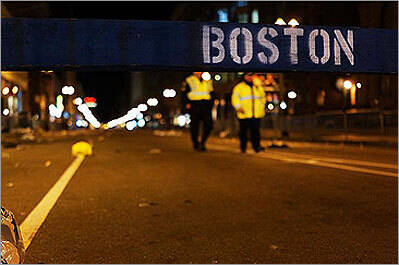The events on Monday afternoon that have left three dead and more than one-hundred people injured near the finish line of the Boston Marathon are what the Trappist monk Thomas Merton might describe as "The Unspeakable."
Merton meant several things when he used this term as the title of a collection of essays titled, Raids on the Unspeakable (New Directions, 1966), he was talking about the categorical violence that we recognize in the horrors like those witnessed on Monday in Boston, as well as those more subtle ways in which systems of injustice -- often quite subtle and unpronounced in our societies -- are perpetuated in silence and unrecognition.
I thought of Merton yesterday because there are times when our encounter with something so terrible and terrifying pushes us to the edges of the effable, leaving us unable to speak. Such experiences of sin and violence in our world are concrete experiences of The Unspeakable. Merton explains in part what he means in Raids on the Unspeakable:
It is the void that contradicts everything that is spoken even before the words are said...It is the emptiness of "the end." Not necessarily the end of the world, but a theological point of no return, a climax of absolute finality in refusal, in equivocation, in disorder, in absurdity, which can be broken open again to truth only by miracle, by the coming of God...for Christian hope begins where every other hope stands frozen stiff before the face of the Unspeakable (4-5).
What can one say in the face of such scandalous violence in one's own backyard? I live in Boston and, quite fortunately, was not anywhere near the explosions yesterday afternoon. Yet, the saddened atmosphere of a city that is otherwise transformed by the positive enthusiasm of one of its long-standing and community-building traditions struck me no less. What does one do when encountering an experience that is so Unspeakable?
During this Easter Season we continue to celebrate new life in the Risen Christ, life that is greater than death, life that proclaims in the Resurrection that indeed death does not have the last word. There is no justification for the senseless, unspeakable suffering in Boston yesterday, but as a people of faith we turn to God in prayer recognizing that, as Merton reminds us, "Christian hope begins where every other hope stands frozen stiff" in the face of the bombings yesterday.
In addition to prayers for the victims and their families in Boston, my thoughts were led to think about all the thousands of children, women, and men around the world that live in the face of The Unspeakable violence we encountered in the United States yesterday. Marketplaces, buses, houses of worship, schools, and neighborhoods all affected by the terror of violence and fear that we in the United States cannot begin to imagine.
My prayers today go out to those in Boston and those beyond who encounter this sense of the Unspeakble absurdity of suffering and loss, fear and death, terror in the heart of their home.








